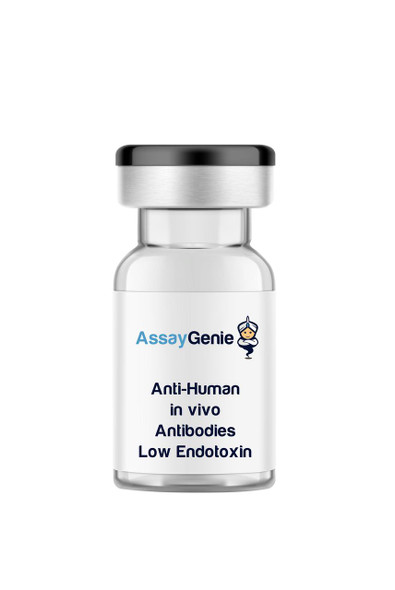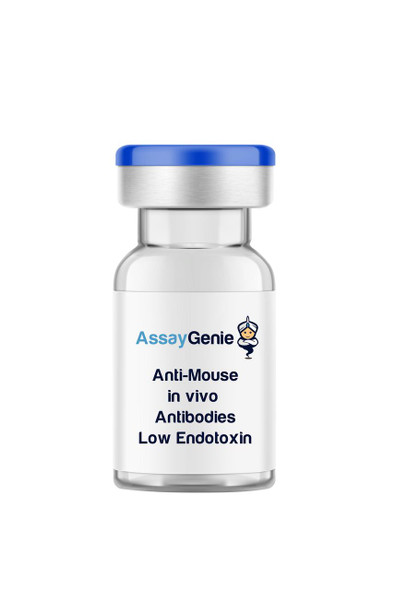Anti-Human/Mouse Integrin β7 In Vivo Antibody - Low Endotoxin
- SKU:
- IVMB0087
- Product Type:
- In Vivo Monoclonal Antibody
- Clone:
- FIB504
- Protein:
- Integrin Beta 7
- Isotype:
- Rat IgG2a kappa
- Reactivity:
- Human
- Mouse
- Synonyms:
- beta-7 Integrin
- integrin beta-p
- ITGB7
- Research Area:
- Adhesion & Migration
- Endotoxin Level:
- Low Endotoxin
- Host Species:
- Rat
- Applications:
- Blocking
- CyTOF
- FC
- IP
Description
Anti-Human/Mouse Integrin β7 In Vivo Antibody - Low Endotoxin
Introducing the Anti-Human/Murine Integrin α7 In Vivo Antibody - Low Endotoxin from Assay Genie, a highly specific monoclonal antibody designed for in vivo applications. This antibody targets the Integrin alpha-7 (ITGA7) protein, significant for its role in muscle development and integrity, making it ideal for research in cell adhesion, signaling, and muscle-related studies. With stringent isotype and quality controls, it ensures high purity and low endotoxin levels (<1.0 EU/mg), perfectly suited for ELISA, flow cytometry, immunohistochemistry, and other assays.
Available in various sizes, it is formulated in phosphate-buffered saline for stability and efficacy. Enhance your research with this reliable and versatile antibody. Integrin α7 is a transmembrane glycoprotein that plays a vital role in the attachment of muscle cells (myocytes) to the extracellular matrix, thereby maintaining muscle structure and function. It is crucial for muscle repair and regeneration and is implicated in various muscular diseases and conditions.
| Product Name: | Anti-Human/Mouse Integrin β7 In Vivo Antibody - Low Endotoxin |
| Product Code: | IVMB0087 |
| Size: | 1mg, 5mg, 25mg, 50mg, 100mg |
| Clone: | FIB504 |
| Protein: | Integrin Beta 7 |
| Product Type: | Monoclonal Antibody |
| Synonyms: | beta-7 Integrin, integrin beta-p, ITGB7 |
| Isotype: | Rat IgG2a κ |
| Reactivity: | Human/Mouse |
| Immunogen: | TK1 Cells |
| Applications: | B, CyTOF®, FC, IP |
| Formulation: | This monoclonal antibody is aseptically packaged and formulated in 0.01 M phosphate buffered saline (150 mM NaCl) PBS pH 7.2 - 7.4 with no carrier protein, potassium, calcium or preservatives added. |
| Endotoxin Level: | < 1.0 EU/mg as determined by the LAL method |
| Purity: | ≥95% monomer by analytical SEC >95% by SDS Page |
| Preparation: | Functional grade preclinical antibodies are manufactured in an animal free facility using only In vitro protein free cell culture techniques and are purified by a multi-step process including the use of protein A or G to assure extremely low levels of endotoxins, leachable protein A or aggregates. |
| Storage and Handling: | Functional grade preclinical antibodies may be stored sterile as received at 2-8°C for up to one month. For longer term storage, aseptically aliquot in working volumes without diluting and store at -80°C. Avoid Repeated Freeze Thaw Cycles. |
| Applications: | B, CyTOF®, FC, IP |
| Recommended Usage: | FC The suggested concentration of use for clone FIB504 antibody for staining cells in flow cytometry is ≤0.5 µg per 106 in a volume of 100 µl or 100 µl of whole blood. Each lot of this antibody is quality control tested. |
| Reactivity: | Human/Mouse |
| Host Species: | Rat |
| Specificity: | Clone FIB504 recognizes an epitope on human/mouse integrin beta-7. |
| Antigen Distribution: | Integrin α4beta-7 is expressed on subsets of peripheral lymphocytes, thymocytes, and bone marrow progenitors. The αEbeta-7 integrin is expressed on mucosal T cells, including intraepithelial T lymphocytes (IELs) and lamina propria T cells, subsets of dendritic cells, and regulatory T cells (Tregs)8. |
| Immunogen: | TK1 Cells |
| Concentration: | ≥ 5.0 mg/ml |
| Endotoxin Level: | < 1.0 EU/mg as determined by the LAL method |
| Purity: | ≥95% monomer by analytical SEC >95% by SDS Page |
| Formulation: | This monoclonal antibody is aseptically packaged and formulated in 0.01 M phosphate buffered saline (150 mM NaCl) PBS pH 7.2 - 7.4 with no carrier protein, potassium, calcium or preservatives added. |
| Preparation: | Functional grade preclinical antibodies are manufactured in an animal free facility using only In vitro protein free cell culture techniques and are purified by a multi-step process including the use of protein A or G to assure extremely low levels of endotoxins, leachable protein A or aggregates. |
| Storage and Handling: | Functional grade preclinical antibodies may be stored sterile as received at 2-8°C for up to one month. For longer term storage, aseptically aliquot in working volumes without diluting and store at -80°C. Avoid Repeated Freeze Thaw Cycles. |
Integrin β7 antibody, clone FIB504, recognizes integrin β7, a 130 kDa membrane glycoprotein of the Ig superfamily. Integrin β7 forms heterodimers with both the α4 (CD49d) and aE (CD103) integrins. α4β7 integrin is expressed on subsets of peripheral lymphocytes, thymocytes, and bone marrow progenitors1,2. It mediates adhesion to mucosal endothelial cells, promoting leukocyte transendothelial migration through interactions with mucosal addressin cell adhesion molecule-1 (MAdCAM-1)3,4. The αEβ7 integrin is expressed on mucosal T cells, including intraepithelial T lymphocytes (IELs) and lamina propria T cells5,6, subsets of dendritic cells7, and regulatory T cells (Tregs)8. It facilitates retention in the gut epithelial layer via interactions with E-cadherin9. Anti-β7 antibodies block both the homing to and retention in the gut of pathogenic T cells10 and are currently under evaluation in a phase 3 clinical trial to treat inflammatory bowel disease11.
| Technical Datasheet: | View |
| Protein: | Integrin Beta 7 |
| Function: | Lymphocyte adhesion, hematopoietic progenitor cells migration |
| Ligand/Receptor: | CD49d/beta-7: VCAM-1 (CD106), MAdCAM-1 and fibronectin; CD103/beta-7: E-cadherin |
| Research Area: | Cell Biology, Immunology, Neuroscience |
Meet the team!
Shane Costigan
Territory Manager & Team Lead
Abdul Khadim
Sales Executive





![Anti-Mouse/Human CD44 [IM7] In Vivo Antibody - Low Endotoxin Anti-Mouse/Human CD44 [IM7] In Vivo Antibody - Low Endotoxin](https://cdn11.bigcommerce.com/s-h68l9z2lnx/images/stencil/590x590/products/214413/569499/anti-mousehuman-cd44-im7-in-vivo-antibody-low-endotoxin__61349.1673497113.jpg?c=2)





